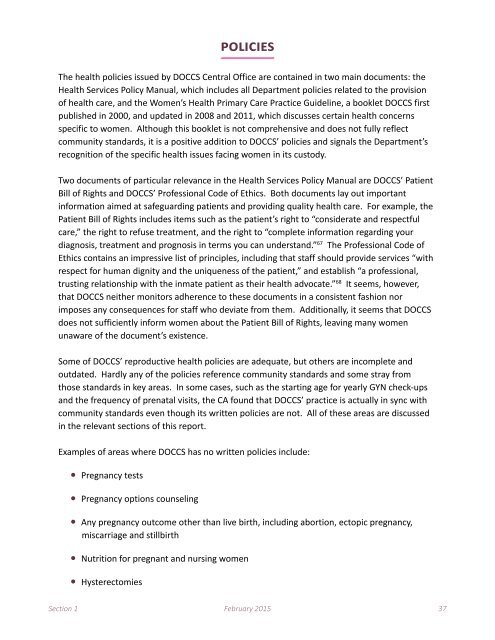Reproductive-Injustice-FULL-REPORT-FINAL-2-11-15
Reproductive-Injustice-FULL-REPORT-FINAL-2-11-15
Reproductive-Injustice-FULL-REPORT-FINAL-2-11-15
You also want an ePaper? Increase the reach of your titles
YUMPU automatically turns print PDFs into web optimized ePapers that Google loves.
policies<br />
The health policies issued by DOCCS Central Office are contained in two main documents: the<br />
Health Services Policy Manual, which includes all Department policies related to the provision<br />
of health care, and the Women’s Health Primary Care Practice Guideline, a booklet DOCCS first<br />
published in 2000, and updated in 2008 and 20<strong>11</strong>, which discusses certain health concerns<br />
specific to women. Although this booklet is not comprehensive and does not fully reflect<br />
community standards, it is a positive addition to DOCCS’ policies and signals the Department’s<br />
recognition of the specific health issues facing women in its custody.<br />
Two documents of particular relevance in the Health Services Policy Manual are DOCCS’ Patient<br />
Bill of Rights and DOCCS’ Professional Code of Ethics. Both documents lay out important<br />
information aimed at safeguarding patients and providing quality health care. For example, the<br />
Patient Bill of Rights includes items such as the patient’s right to “considerate and respectful<br />
care,” the right to refuse treatment, and the right to “complete information regarding your<br />
diagnosis, treatment and prognosis in terms you can understand.” 67 The Professional Code of<br />
Ethics contains an impressive list of principles, including that staff should provide services “with<br />
respect for human dignity and the uniqueness of the patient,” and establish “a professional,<br />
trusting relationship with the inmate patient as their health advocate.” 68 It seems, however,<br />
that DOCCS neither monitors adherence to these documents in a consistent fashion nor<br />
imposes any consequences for staff who deviate from them. Additionally, it seems that DOCCS<br />
does not sufficiently inform women about the Patient Bill of Rights, leaving many women<br />
unaware of the document’s existence.<br />
Some of DOCCS’ reproductive health policies are adequate, but others are incomplete and<br />
outdated. Hardly any of the policies reference community standards and some stray from<br />
those standards in key areas. In some cases, such as the starting age for yearly GYN check-ups<br />
and the frequency of prenatal visits, the CA found that DOCCS’ practice is actually in sync with<br />
community standards even though its written policies are not. All of these areas are discussed<br />
in the relevant sections of this report.<br />
Examples of areas where DOCCS has no written policies include:<br />
• Pregnancy tests<br />
• Pregnancy options counseling<br />
• Any pregnancy outcome other than live birth, including abortion, ectopic pregnancy,<br />
miscarriage and stillbirth<br />
• Nutrition for pregnant and nursing women<br />
• Hysterectomies<br />
Section 1 February 20<strong>15</strong> 37


